NMNF5103: Reflective Practice in Nursing - January Semester 2018
VerifiedAdded on 2023/06/15
|20
|6380
|420
Essay
AI Summary
This essay discusses the importance of reflective practice in nursing, drawing upon the author's experiences as a head nurse and insights gained from Module NMNF5103. It explores the philosophical underpinnings of reflection, emphasizing the contributions of thinkers like Aristotle, Dewey, and Schön. The essay details the development of skills necessary for reflective practice, including self-awareness, critical analysis, and the ability to learn from experiences. It also examines how to support practitioners in reflective writing, the use of journals and diaries, and the application of reflection to clinical practice. The author reflects on personal experiences, discussing the assessment and evaluation of reflection and the development of reflective practice through learning support. The essay concludes by highlighting the significance of reflective practice in fostering professional growth and improving patient care.
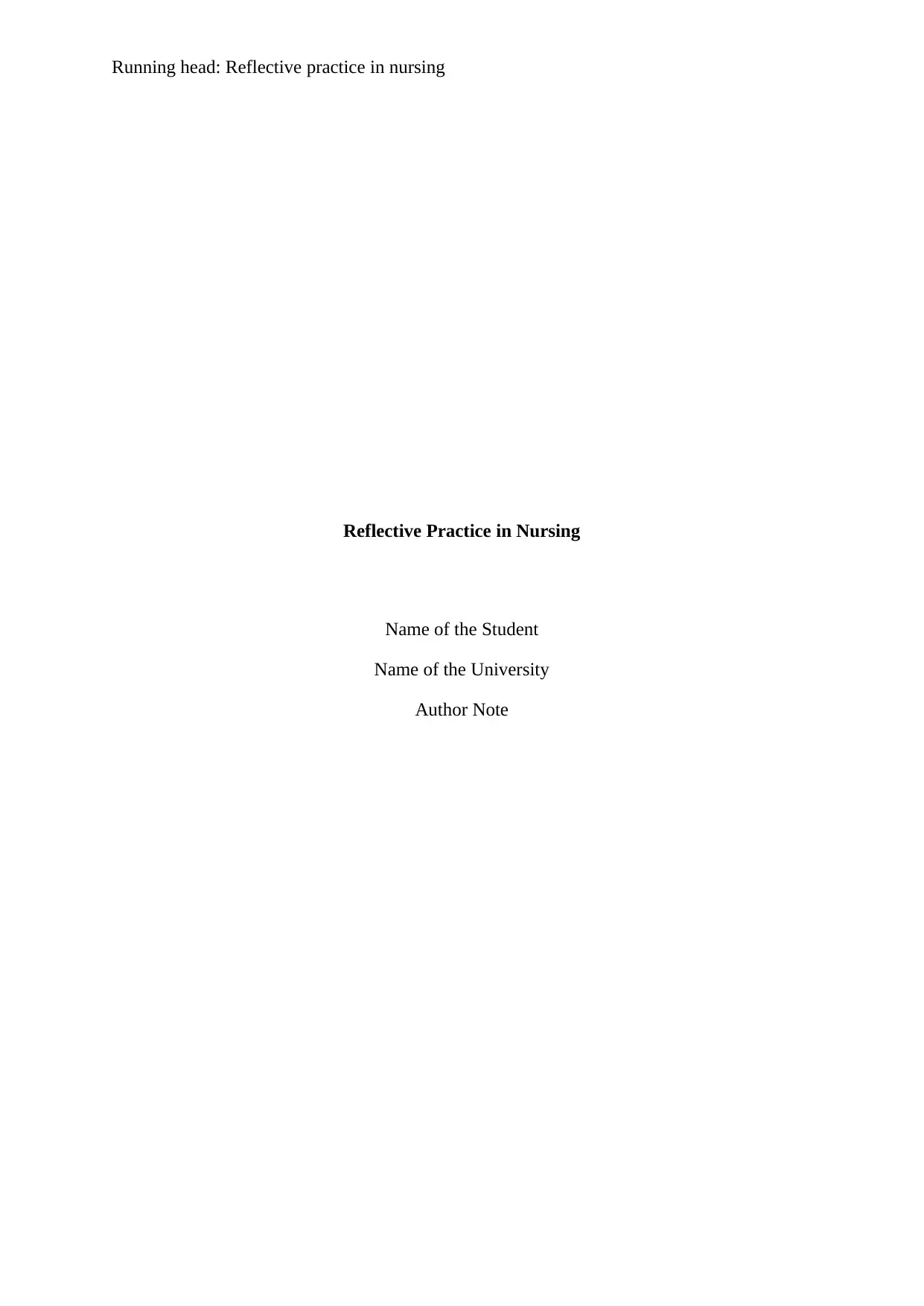
Running head: Reflective practice in nursing
Reflective Practice in Nursing
Name of the Student
Name of the University
Author Note
Reflective Practice in Nursing
Name of the Student
Name of the University
Author Note
Paraphrase This Document
Need a fresh take? Get an instant paraphrase of this document with our AI Paraphraser
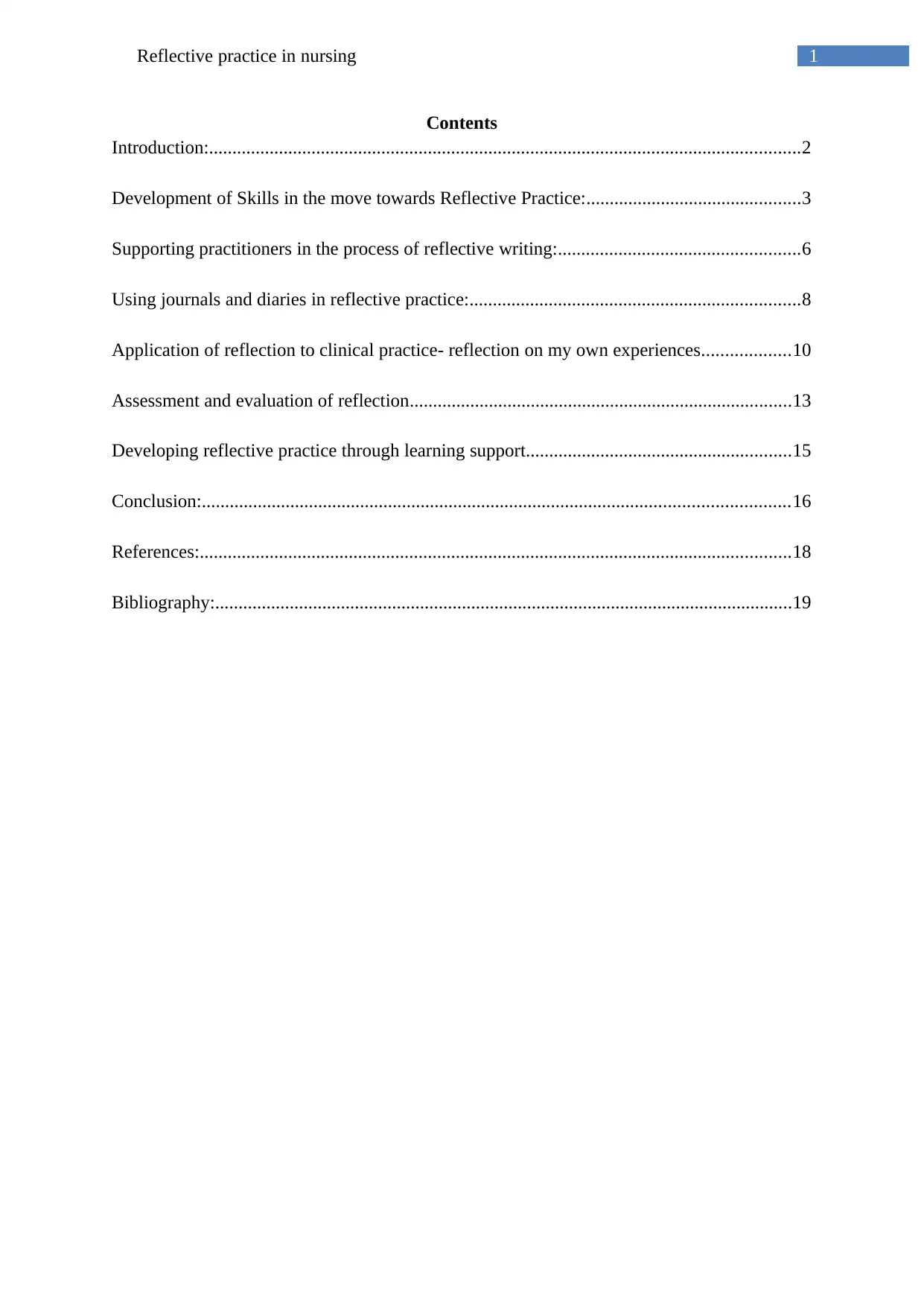
1Reflective practice in nursing
Contents
Introduction:...............................................................................................................................2
Development of Skills in the move towards Reflective Practice:..............................................3
Supporting practitioners in the process of reflective writing:....................................................6
Using journals and diaries in reflective practice:.......................................................................8
Application of reflection to clinical practice- reflection on my own experiences...................10
Assessment and evaluation of reflection..................................................................................13
Developing reflective practice through learning support.........................................................15
Conclusion:..............................................................................................................................16
References:...............................................................................................................................18
Bibliography:............................................................................................................................19
Contents
Introduction:...............................................................................................................................2
Development of Skills in the move towards Reflective Practice:..............................................3
Supporting practitioners in the process of reflective writing:....................................................6
Using journals and diaries in reflective practice:.......................................................................8
Application of reflection to clinical practice- reflection on my own experiences...................10
Assessment and evaluation of reflection..................................................................................13
Developing reflective practice through learning support.........................................................15
Conclusion:..............................................................................................................................16
References:...............................................................................................................................18
Bibliography:............................................................................................................................19
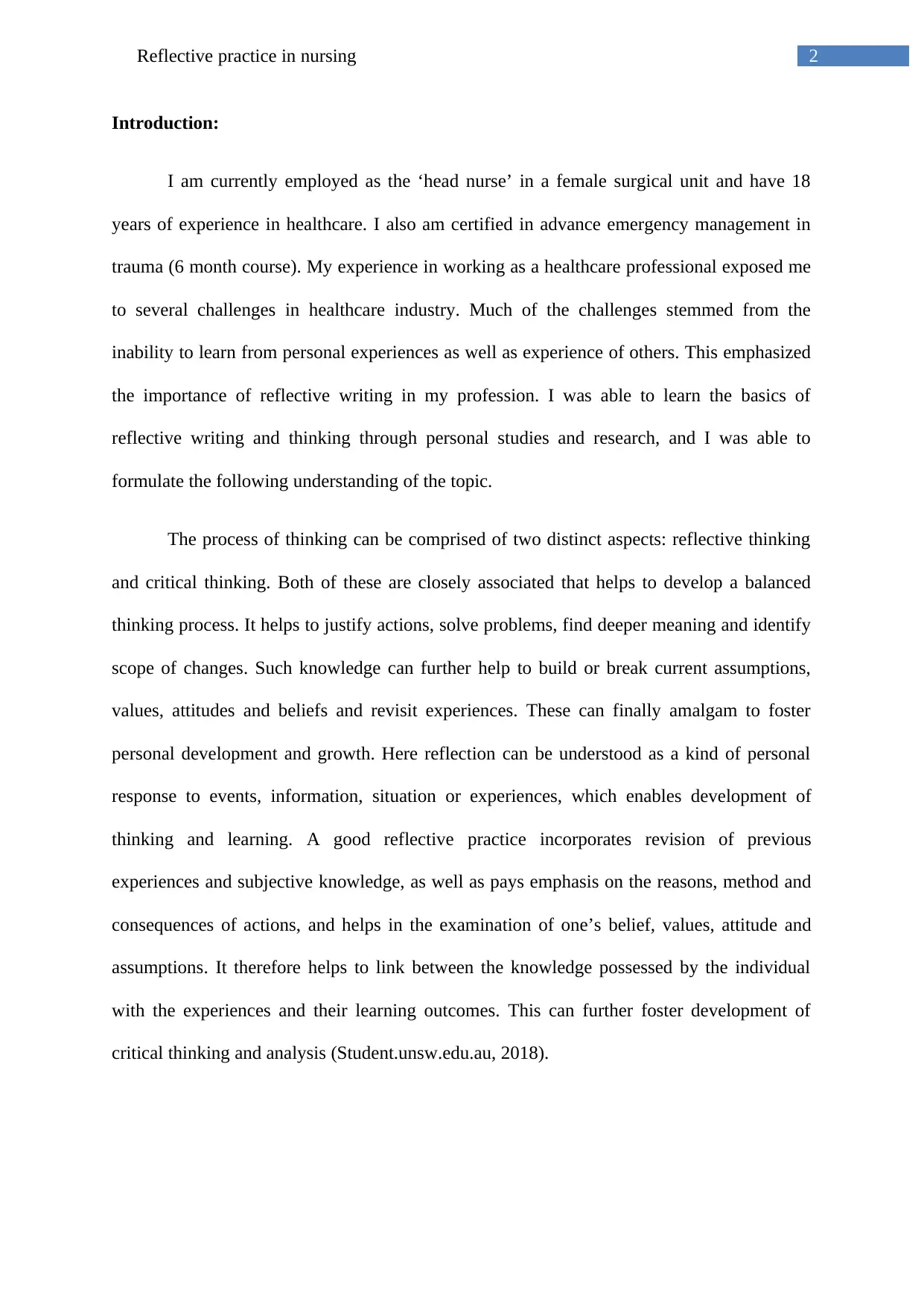
2Reflective practice in nursing
Introduction:
I am currently employed as the ‘head nurse’ in a female surgical unit and have 18
years of experience in healthcare. I also am certified in advance emergency management in
trauma (6 month course). My experience in working as a healthcare professional exposed me
to several challenges in healthcare industry. Much of the challenges stemmed from the
inability to learn from personal experiences as well as experience of others. This emphasized
the importance of reflective writing in my profession. I was able to learn the basics of
reflective writing and thinking through personal studies and research, and I was able to
formulate the following understanding of the topic.
The process of thinking can be comprised of two distinct aspects: reflective thinking
and critical thinking. Both of these are closely associated that helps to develop a balanced
thinking process. It helps to justify actions, solve problems, find deeper meaning and identify
scope of changes. Such knowledge can further help to build or break current assumptions,
values, attitudes and beliefs and revisit experiences. These can finally amalgam to foster
personal development and growth. Here reflection can be understood as a kind of personal
response to events, information, situation or experiences, which enables development of
thinking and learning. A good reflective practice incorporates revision of previous
experiences and subjective knowledge, as well as pays emphasis on the reasons, method and
consequences of actions, and helps in the examination of one’s belief, values, attitude and
assumptions. It therefore helps to link between the knowledge possessed by the individual
with the experiences and their learning outcomes. This can further foster development of
critical thinking and analysis (Student.unsw.edu.au, 2018).
Introduction:
I am currently employed as the ‘head nurse’ in a female surgical unit and have 18
years of experience in healthcare. I also am certified in advance emergency management in
trauma (6 month course). My experience in working as a healthcare professional exposed me
to several challenges in healthcare industry. Much of the challenges stemmed from the
inability to learn from personal experiences as well as experience of others. This emphasized
the importance of reflective writing in my profession. I was able to learn the basics of
reflective writing and thinking through personal studies and research, and I was able to
formulate the following understanding of the topic.
The process of thinking can be comprised of two distinct aspects: reflective thinking
and critical thinking. Both of these are closely associated that helps to develop a balanced
thinking process. It helps to justify actions, solve problems, find deeper meaning and identify
scope of changes. Such knowledge can further help to build or break current assumptions,
values, attitudes and beliefs and revisit experiences. These can finally amalgam to foster
personal development and growth. Here reflection can be understood as a kind of personal
response to events, information, situation or experiences, which enables development of
thinking and learning. A good reflective practice incorporates revision of previous
experiences and subjective knowledge, as well as pays emphasis on the reasons, method and
consequences of actions, and helps in the examination of one’s belief, values, attitude and
assumptions. It therefore helps to link between the knowledge possessed by the individual
with the experiences and their learning outcomes. This can further foster development of
critical thinking and analysis (Student.unsw.edu.au, 2018).
⊘ This is a preview!⊘
Do you want full access?
Subscribe today to unlock all pages.

Trusted by 1+ million students worldwide
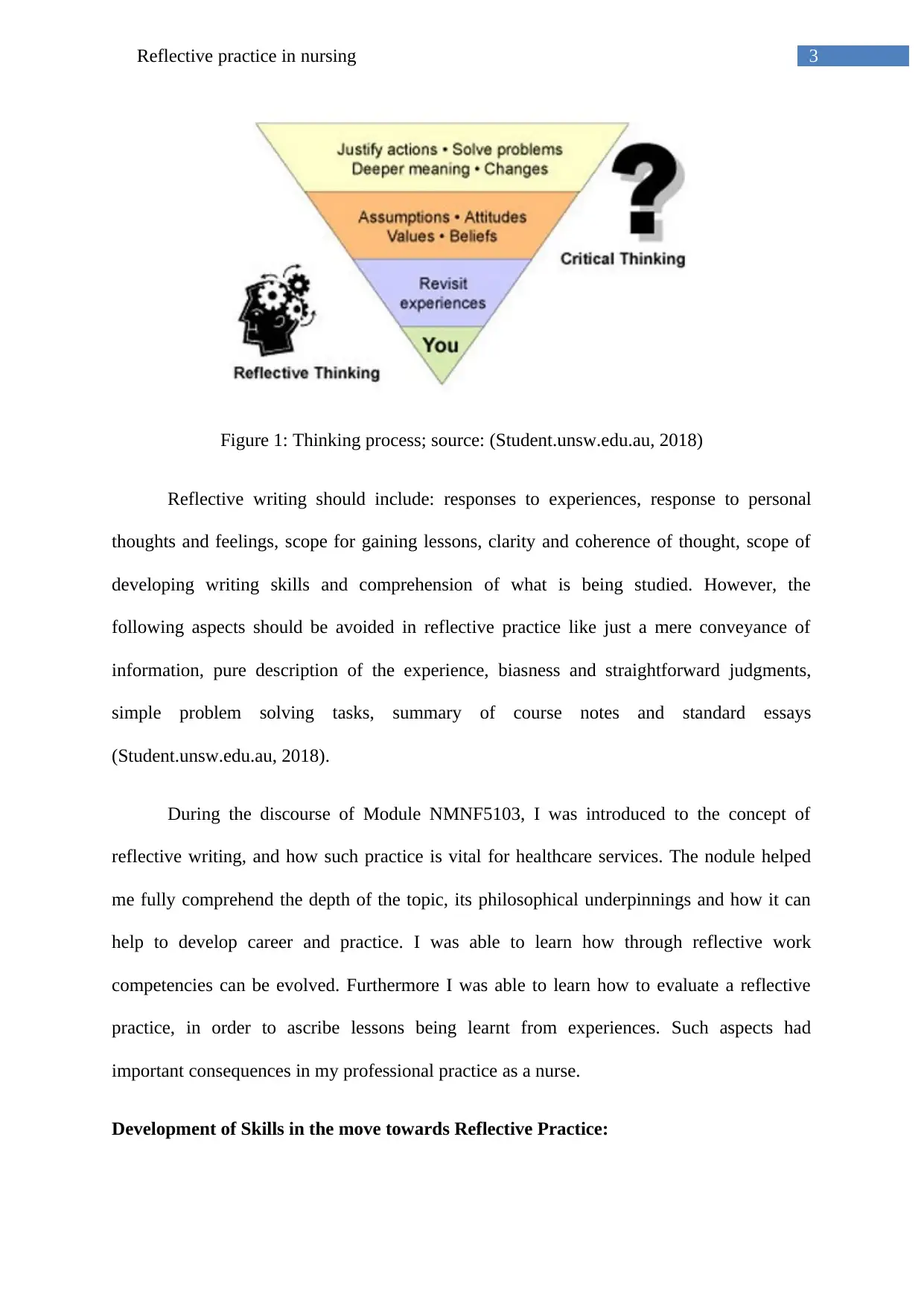
3Reflective practice in nursing
Figure 1: Thinking process; source: (Student.unsw.edu.au, 2018)
Reflective writing should include: responses to experiences, response to personal
thoughts and feelings, scope for gaining lessons, clarity and coherence of thought, scope of
developing writing skills and comprehension of what is being studied. However, the
following aspects should be avoided in reflective practice like just a mere conveyance of
information, pure description of the experience, biasness and straightforward judgments,
simple problem solving tasks, summary of course notes and standard essays
(Student.unsw.edu.au, 2018).
During the discourse of Module NMNF5103, I was introduced to the concept of
reflective writing, and how such practice is vital for healthcare services. The nodule helped
me fully comprehend the depth of the topic, its philosophical underpinnings and how it can
help to develop career and practice. I was able to learn how through reflective work
competencies can be evolved. Furthermore I was able to learn how to evaluate a reflective
practice, in order to ascribe lessons being learnt from experiences. Such aspects had
important consequences in my professional practice as a nurse.
Development of Skills in the move towards Reflective Practice:
Figure 1: Thinking process; source: (Student.unsw.edu.au, 2018)
Reflective writing should include: responses to experiences, response to personal
thoughts and feelings, scope for gaining lessons, clarity and coherence of thought, scope of
developing writing skills and comprehension of what is being studied. However, the
following aspects should be avoided in reflective practice like just a mere conveyance of
information, pure description of the experience, biasness and straightforward judgments,
simple problem solving tasks, summary of course notes and standard essays
(Student.unsw.edu.au, 2018).
During the discourse of Module NMNF5103, I was introduced to the concept of
reflective writing, and how such practice is vital for healthcare services. The nodule helped
me fully comprehend the depth of the topic, its philosophical underpinnings and how it can
help to develop career and practice. I was able to learn how through reflective work
competencies can be evolved. Furthermore I was able to learn how to evaluate a reflective
practice, in order to ascribe lessons being learnt from experiences. Such aspects had
important consequences in my professional practice as a nurse.
Development of Skills in the move towards Reflective Practice:
Paraphrase This Document
Need a fresh take? Get an instant paraphrase of this document with our AI Paraphraser
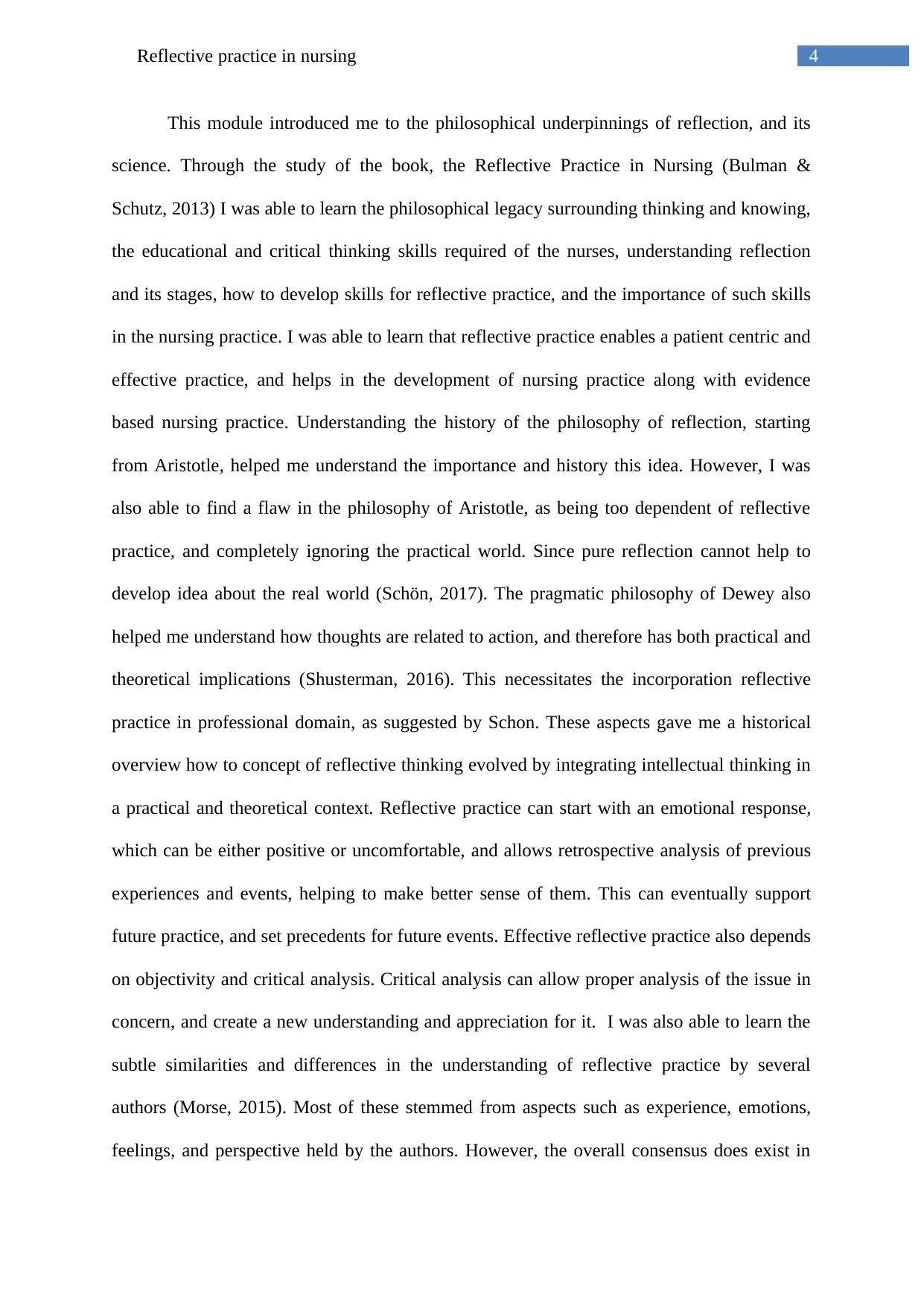
4Reflective practice in nursing
This module introduced me to the philosophical underpinnings of reflection, and its
science. Through the study of the book, the Reflective Practice in Nursing (Bulman &
Schutz, 2013) I was able to learn the philosophical legacy surrounding thinking and knowing,
the educational and critical thinking skills required of the nurses, understanding reflection
and its stages, how to develop skills for reflective practice, and the importance of such skills
in the nursing practice. I was able to learn that reflective practice enables a patient centric and
effective practice, and helps in the development of nursing practice along with evidence
based nursing practice. Understanding the history of the philosophy of reflection, starting
from Aristotle, helped me understand the importance and history this idea. However, I was
also able to find a flaw in the philosophy of Aristotle, as being too dependent of reflective
practice, and completely ignoring the practical world. Since pure reflection cannot help to
develop idea about the real world (Schön, 2017). The pragmatic philosophy of Dewey also
helped me understand how thoughts are related to action, and therefore has both practical and
theoretical implications (Shusterman, 2016). This necessitates the incorporation reflective
practice in professional domain, as suggested by Schon. These aspects gave me a historical
overview how to concept of reflective thinking evolved by integrating intellectual thinking in
a practical and theoretical context. Reflective practice can start with an emotional response,
which can be either positive or uncomfortable, and allows retrospective analysis of previous
experiences and events, helping to make better sense of them. This can eventually support
future practice, and set precedents for future events. Effective reflective practice also depends
on objectivity and critical analysis. Critical analysis can allow proper analysis of the issue in
concern, and create a new understanding and appreciation for it. I was also able to learn the
subtle similarities and differences in the understanding of reflective practice by several
authors (Morse, 2015). Most of these stemmed from aspects such as experience, emotions,
feelings, and perspective held by the authors. However, the overall consensus does exist in
This module introduced me to the philosophical underpinnings of reflection, and its
science. Through the study of the book, the Reflective Practice in Nursing (Bulman &
Schutz, 2013) I was able to learn the philosophical legacy surrounding thinking and knowing,
the educational and critical thinking skills required of the nurses, understanding reflection
and its stages, how to develop skills for reflective practice, and the importance of such skills
in the nursing practice. I was able to learn that reflective practice enables a patient centric and
effective practice, and helps in the development of nursing practice along with evidence
based nursing practice. Understanding the history of the philosophy of reflection, starting
from Aristotle, helped me understand the importance and history this idea. However, I was
also able to find a flaw in the philosophy of Aristotle, as being too dependent of reflective
practice, and completely ignoring the practical world. Since pure reflection cannot help to
develop idea about the real world (Schön, 2017). The pragmatic philosophy of Dewey also
helped me understand how thoughts are related to action, and therefore has both practical and
theoretical implications (Shusterman, 2016). This necessitates the incorporation reflective
practice in professional domain, as suggested by Schon. These aspects gave me a historical
overview how to concept of reflective thinking evolved by integrating intellectual thinking in
a practical and theoretical context. Reflective practice can start with an emotional response,
which can be either positive or uncomfortable, and allows retrospective analysis of previous
experiences and events, helping to make better sense of them. This can eventually support
future practice, and set precedents for future events. Effective reflective practice also depends
on objectivity and critical analysis. Critical analysis can allow proper analysis of the issue in
concern, and create a new understanding and appreciation for it. I was also able to learn the
subtle similarities and differences in the understanding of reflective practice by several
authors (Morse, 2015). Most of these stemmed from aspects such as experience, emotions,
feelings, and perspective held by the authors. However, the overall consensus does exist in
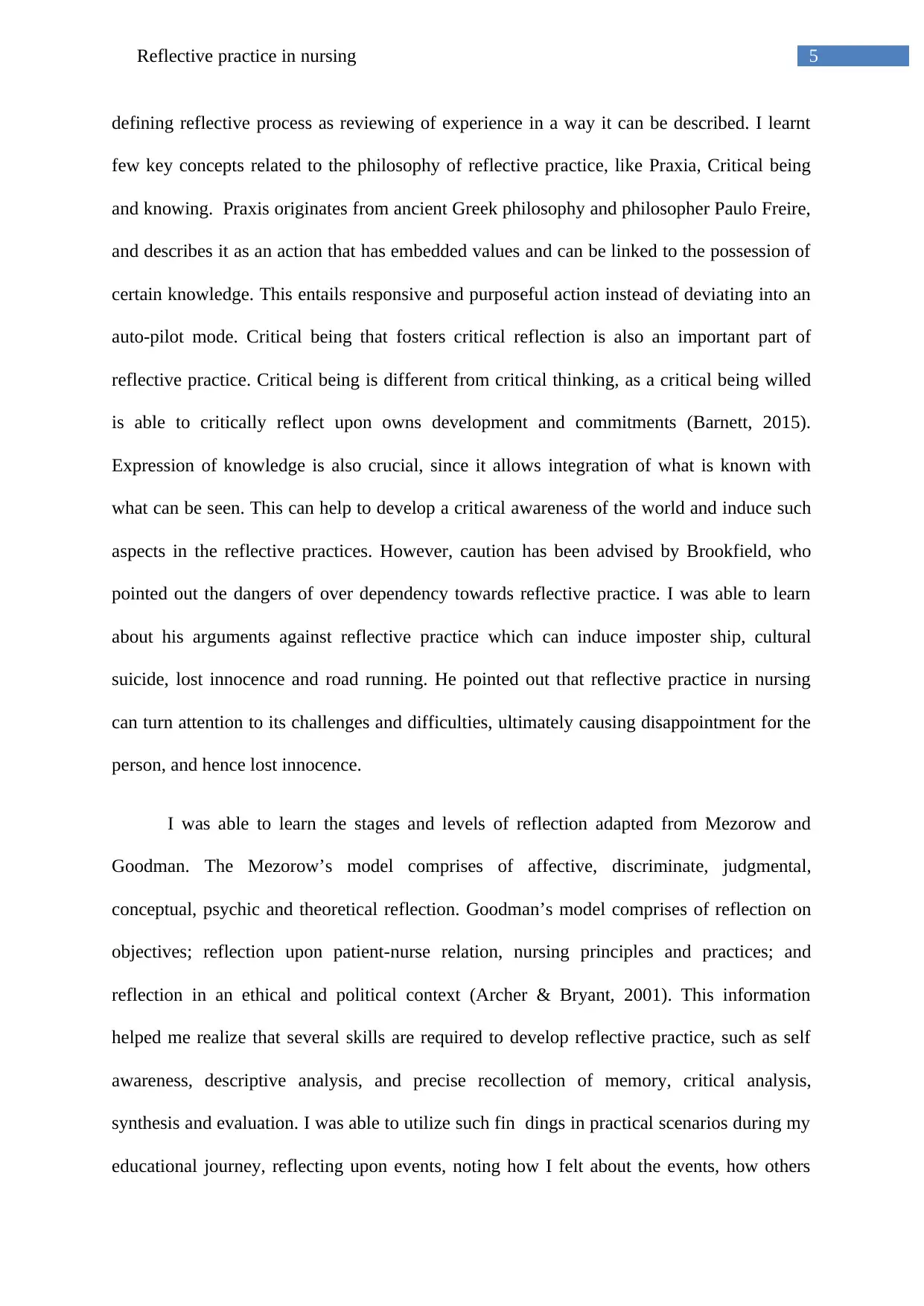
5Reflective practice in nursing
defining reflective process as reviewing of experience in a way it can be described. I learnt
few key concepts related to the philosophy of reflective practice, like Praxia, Critical being
and knowing. Praxis originates from ancient Greek philosophy and philosopher Paulo Freire,
and describes it as an action that has embedded values and can be linked to the possession of
certain knowledge. This entails responsive and purposeful action instead of deviating into an
auto-pilot mode. Critical being that fosters critical reflection is also an important part of
reflective practice. Critical being is different from critical thinking, as a critical being willed
is able to critically reflect upon owns development and commitments (Barnett, 2015).
Expression of knowledge is also crucial, since it allows integration of what is known with
what can be seen. This can help to develop a critical awareness of the world and induce such
aspects in the reflective practices. However, caution has been advised by Brookfield, who
pointed out the dangers of over dependency towards reflective practice. I was able to learn
about his arguments against reflective practice which can induce imposter ship, cultural
suicide, lost innocence and road running. He pointed out that reflective practice in nursing
can turn attention to its challenges and difficulties, ultimately causing disappointment for the
person, and hence lost innocence.
I was able to learn the stages and levels of reflection adapted from Mezorow and
Goodman. The Mezorow’s model comprises of affective, discriminate, judgmental,
conceptual, psychic and theoretical reflection. Goodman’s model comprises of reflection on
objectives; reflection upon patient-nurse relation, nursing principles and practices; and
reflection in an ethical and political context (Archer & Bryant, 2001). This information
helped me realize that several skills are required to develop reflective practice, such as self
awareness, descriptive analysis, and precise recollection of memory, critical analysis,
synthesis and evaluation. I was able to utilize such fin dings in practical scenarios during my
educational journey, reflecting upon events, noting how I felt about the events, how others
defining reflective process as reviewing of experience in a way it can be described. I learnt
few key concepts related to the philosophy of reflective practice, like Praxia, Critical being
and knowing. Praxis originates from ancient Greek philosophy and philosopher Paulo Freire,
and describes it as an action that has embedded values and can be linked to the possession of
certain knowledge. This entails responsive and purposeful action instead of deviating into an
auto-pilot mode. Critical being that fosters critical reflection is also an important part of
reflective practice. Critical being is different from critical thinking, as a critical being willed
is able to critically reflect upon owns development and commitments (Barnett, 2015).
Expression of knowledge is also crucial, since it allows integration of what is known with
what can be seen. This can help to develop a critical awareness of the world and induce such
aspects in the reflective practices. However, caution has been advised by Brookfield, who
pointed out the dangers of over dependency towards reflective practice. I was able to learn
about his arguments against reflective practice which can induce imposter ship, cultural
suicide, lost innocence and road running. He pointed out that reflective practice in nursing
can turn attention to its challenges and difficulties, ultimately causing disappointment for the
person, and hence lost innocence.
I was able to learn the stages and levels of reflection adapted from Mezorow and
Goodman. The Mezorow’s model comprises of affective, discriminate, judgmental,
conceptual, psychic and theoretical reflection. Goodman’s model comprises of reflection on
objectives; reflection upon patient-nurse relation, nursing principles and practices; and
reflection in an ethical and political context (Archer & Bryant, 2001). This information
helped me realize that several skills are required to develop reflective practice, such as self
awareness, descriptive analysis, and precise recollection of memory, critical analysis,
synthesis and evaluation. I was able to utilize such fin dings in practical scenarios during my
educational journey, reflecting upon events, noting how I felt about the events, how others
⊘ This is a preview!⊘
Do you want full access?
Subscribe today to unlock all pages.

Trusted by 1+ million students worldwide
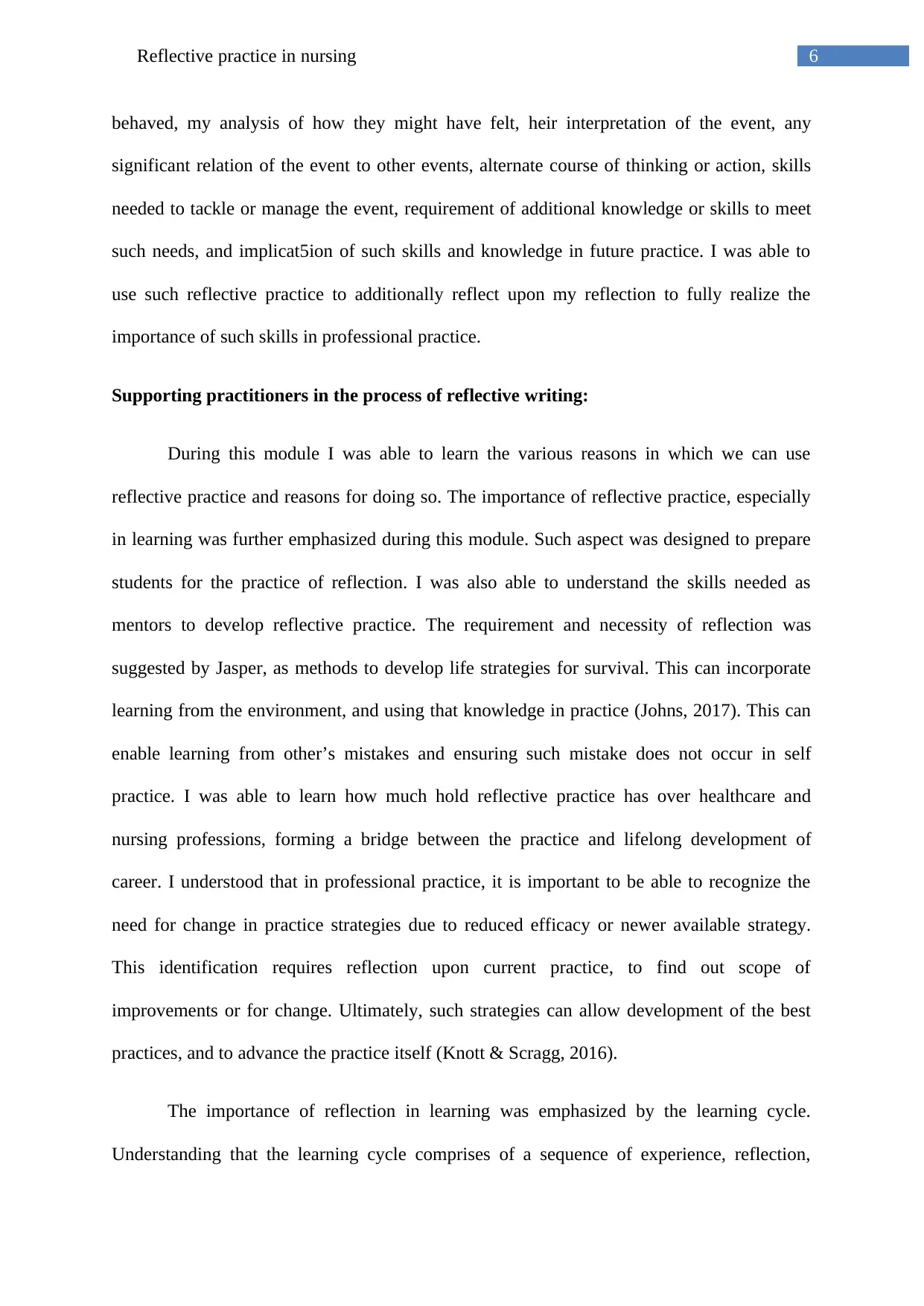
6Reflective practice in nursing
behaved, my analysis of how they might have felt, heir interpretation of the event, any
significant relation of the event to other events, alternate course of thinking or action, skills
needed to tackle or manage the event, requirement of additional knowledge or skills to meet
such needs, and implicat5ion of such skills and knowledge in future practice. I was able to
use such reflective practice to additionally reflect upon my reflection to fully realize the
importance of such skills in professional practice.
Supporting practitioners in the process of reflective writing:
During this module I was able to learn the various reasons in which we can use
reflective practice and reasons for doing so. The importance of reflective practice, especially
in learning was further emphasized during this module. Such aspect was designed to prepare
students for the practice of reflection. I was also able to understand the skills needed as
mentors to develop reflective practice. The requirement and necessity of reflection was
suggested by Jasper, as methods to develop life strategies for survival. This can incorporate
learning from the environment, and using that knowledge in practice (Johns, 2017). This can
enable learning from other’s mistakes and ensuring such mistake does not occur in self
practice. I was able to learn how much hold reflective practice has over healthcare and
nursing professions, forming a bridge between the practice and lifelong development of
career. I understood that in professional practice, it is important to be able to recognize the
need for change in practice strategies due to reduced efficacy or newer available strategy.
This identification requires reflection upon current practice, to find out scope of
improvements or for change. Ultimately, such strategies can allow development of the best
practices, and to advance the practice itself (Knott & Scragg, 2016).
The importance of reflection in learning was emphasized by the learning cycle.
Understanding that the learning cycle comprises of a sequence of experience, reflection,
behaved, my analysis of how they might have felt, heir interpretation of the event, any
significant relation of the event to other events, alternate course of thinking or action, skills
needed to tackle or manage the event, requirement of additional knowledge or skills to meet
such needs, and implicat5ion of such skills and knowledge in future practice. I was able to
use such reflective practice to additionally reflect upon my reflection to fully realize the
importance of such skills in professional practice.
Supporting practitioners in the process of reflective writing:
During this module I was able to learn the various reasons in which we can use
reflective practice and reasons for doing so. The importance of reflective practice, especially
in learning was further emphasized during this module. Such aspect was designed to prepare
students for the practice of reflection. I was also able to understand the skills needed as
mentors to develop reflective practice. The requirement and necessity of reflection was
suggested by Jasper, as methods to develop life strategies for survival. This can incorporate
learning from the environment, and using that knowledge in practice (Johns, 2017). This can
enable learning from other’s mistakes and ensuring such mistake does not occur in self
practice. I was able to learn how much hold reflective practice has over healthcare and
nursing professions, forming a bridge between the practice and lifelong development of
career. I understood that in professional practice, it is important to be able to recognize the
need for change in practice strategies due to reduced efficacy or newer available strategy.
This identification requires reflection upon current practice, to find out scope of
improvements or for change. Ultimately, such strategies can allow development of the best
practices, and to advance the practice itself (Knott & Scragg, 2016).
The importance of reflection in learning was emphasized by the learning cycle.
Understanding that the learning cycle comprises of a sequence of experience, reflection,
Paraphrase This Document
Need a fresh take? Get an instant paraphrase of this document with our AI Paraphraser
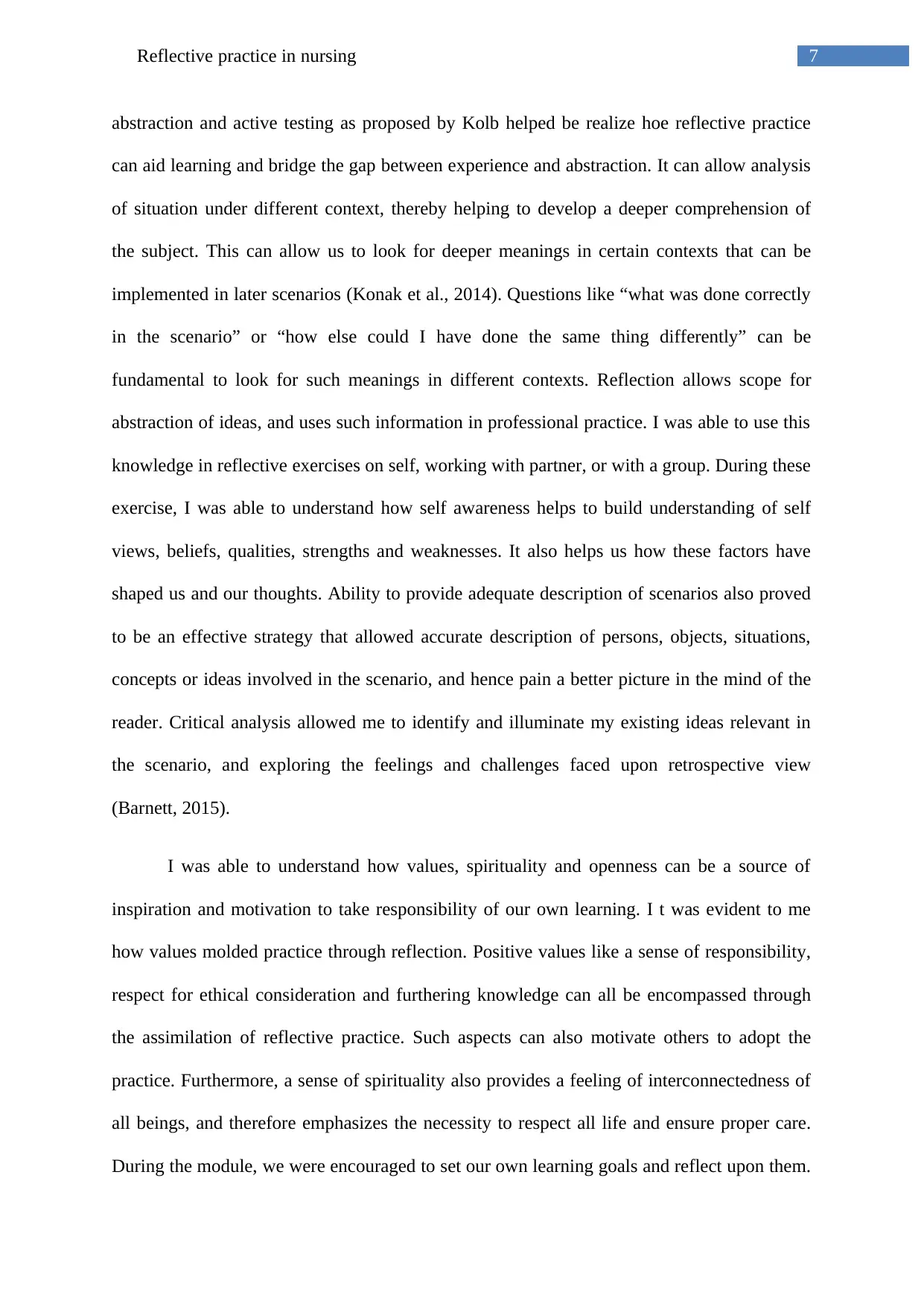
7Reflective practice in nursing
abstraction and active testing as proposed by Kolb helped be realize hoe reflective practice
can aid learning and bridge the gap between experience and abstraction. It can allow analysis
of situation under different context, thereby helping to develop a deeper comprehension of
the subject. This can allow us to look for deeper meanings in certain contexts that can be
implemented in later scenarios (Konak et al., 2014). Questions like “what was done correctly
in the scenario” or “how else could I have done the same thing differently” can be
fundamental to look for such meanings in different contexts. Reflection allows scope for
abstraction of ideas, and uses such information in professional practice. I was able to use this
knowledge in reflective exercises on self, working with partner, or with a group. During these
exercise, I was able to understand how self awareness helps to build understanding of self
views, beliefs, qualities, strengths and weaknesses. It also helps us how these factors have
shaped us and our thoughts. Ability to provide adequate description of scenarios also proved
to be an effective strategy that allowed accurate description of persons, objects, situations,
concepts or ideas involved in the scenario, and hence pain a better picture in the mind of the
reader. Critical analysis allowed me to identify and illuminate my existing ideas relevant in
the scenario, and exploring the feelings and challenges faced upon retrospective view
(Barnett, 2015).
I was able to understand how values, spirituality and openness can be a source of
inspiration and motivation to take responsibility of our own learning. I t was evident to me
how values molded practice through reflection. Positive values like a sense of responsibility,
respect for ethical consideration and furthering knowledge can all be encompassed through
the assimilation of reflective practice. Such aspects can also motivate others to adopt the
practice. Furthermore, a sense of spirituality also provides a feeling of interconnectedness of
all beings, and therefore emphasizes the necessity to respect all life and ensure proper care.
During the module, we were encouraged to set our own learning goals and reflect upon them.
abstraction and active testing as proposed by Kolb helped be realize hoe reflective practice
can aid learning and bridge the gap between experience and abstraction. It can allow analysis
of situation under different context, thereby helping to develop a deeper comprehension of
the subject. This can allow us to look for deeper meanings in certain contexts that can be
implemented in later scenarios (Konak et al., 2014). Questions like “what was done correctly
in the scenario” or “how else could I have done the same thing differently” can be
fundamental to look for such meanings in different contexts. Reflection allows scope for
abstraction of ideas, and uses such information in professional practice. I was able to use this
knowledge in reflective exercises on self, working with partner, or with a group. During these
exercise, I was able to understand how self awareness helps to build understanding of self
views, beliefs, qualities, strengths and weaknesses. It also helps us how these factors have
shaped us and our thoughts. Ability to provide adequate description of scenarios also proved
to be an effective strategy that allowed accurate description of persons, objects, situations,
concepts or ideas involved in the scenario, and hence pain a better picture in the mind of the
reader. Critical analysis allowed me to identify and illuminate my existing ideas relevant in
the scenario, and exploring the feelings and challenges faced upon retrospective view
(Barnett, 2015).
I was able to understand how values, spirituality and openness can be a source of
inspiration and motivation to take responsibility of our own learning. I t was evident to me
how values molded practice through reflection. Positive values like a sense of responsibility,
respect for ethical consideration and furthering knowledge can all be encompassed through
the assimilation of reflective practice. Such aspects can also motivate others to adopt the
practice. Furthermore, a sense of spirituality also provides a feeling of interconnectedness of
all beings, and therefore emphasizes the necessity to respect all life and ensure proper care.
During the module, we were encouraged to set our own learning goals and reflect upon them.
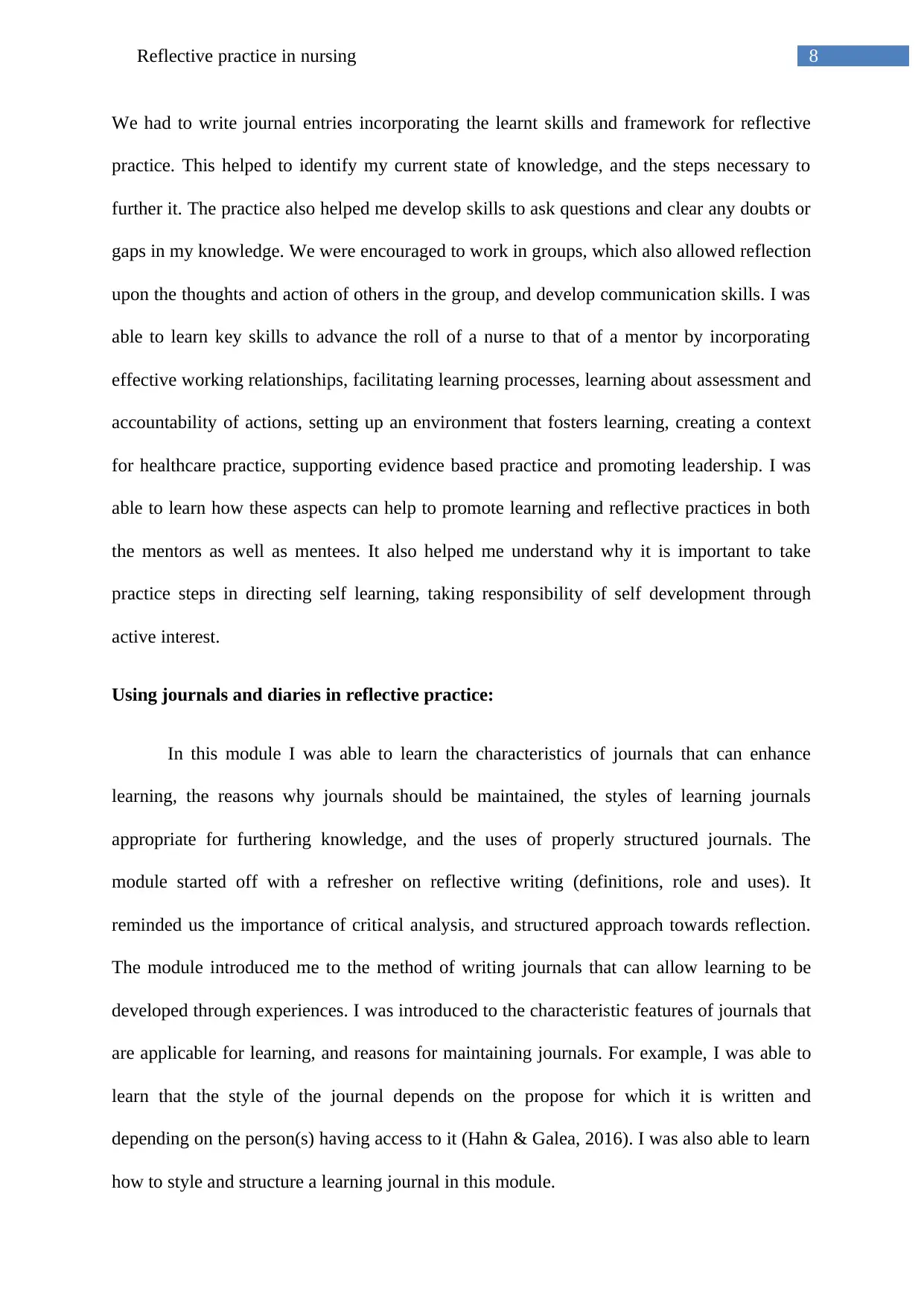
8Reflective practice in nursing
We had to write journal entries incorporating the learnt skills and framework for reflective
practice. This helped to identify my current state of knowledge, and the steps necessary to
further it. The practice also helped me develop skills to ask questions and clear any doubts or
gaps in my knowledge. We were encouraged to work in groups, which also allowed reflection
upon the thoughts and action of others in the group, and develop communication skills. I was
able to learn key skills to advance the roll of a nurse to that of a mentor by incorporating
effective working relationships, facilitating learning processes, learning about assessment and
accountability of actions, setting up an environment that fosters learning, creating a context
for healthcare practice, supporting evidence based practice and promoting leadership. I was
able to learn how these aspects can help to promote learning and reflective practices in both
the mentors as well as mentees. It also helped me understand why it is important to take
practice steps in directing self learning, taking responsibility of self development through
active interest.
Using journals and diaries in reflective practice:
In this module I was able to learn the characteristics of journals that can enhance
learning, the reasons why journals should be maintained, the styles of learning journals
appropriate for furthering knowledge, and the uses of properly structured journals. The
module started off with a refresher on reflective writing (definitions, role and uses). It
reminded us the importance of critical analysis, and structured approach towards reflection.
The module introduced me to the method of writing journals that can allow learning to be
developed through experiences. I was introduced to the characteristic features of journals that
are applicable for learning, and reasons for maintaining journals. For example, I was able to
learn that the style of the journal depends on the propose for which it is written and
depending on the person(s) having access to it (Hahn & Galea, 2016). I was also able to learn
how to style and structure a learning journal in this module.
We had to write journal entries incorporating the learnt skills and framework for reflective
practice. This helped to identify my current state of knowledge, and the steps necessary to
further it. The practice also helped me develop skills to ask questions and clear any doubts or
gaps in my knowledge. We were encouraged to work in groups, which also allowed reflection
upon the thoughts and action of others in the group, and develop communication skills. I was
able to learn key skills to advance the roll of a nurse to that of a mentor by incorporating
effective working relationships, facilitating learning processes, learning about assessment and
accountability of actions, setting up an environment that fosters learning, creating a context
for healthcare practice, supporting evidence based practice and promoting leadership. I was
able to learn how these aspects can help to promote learning and reflective practices in both
the mentors as well as mentees. It also helped me understand why it is important to take
practice steps in directing self learning, taking responsibility of self development through
active interest.
Using journals and diaries in reflective practice:
In this module I was able to learn the characteristics of journals that can enhance
learning, the reasons why journals should be maintained, the styles of learning journals
appropriate for furthering knowledge, and the uses of properly structured journals. The
module started off with a refresher on reflective writing (definitions, role and uses). It
reminded us the importance of critical analysis, and structured approach towards reflection.
The module introduced me to the method of writing journals that can allow learning to be
developed through experiences. I was introduced to the characteristic features of journals that
are applicable for learning, and reasons for maintaining journals. For example, I was able to
learn that the style of the journal depends on the propose for which it is written and
depending on the person(s) having access to it (Hahn & Galea, 2016). I was also able to learn
how to style and structure a learning journal in this module.
⊘ This is a preview!⊘
Do you want full access?
Subscribe today to unlock all pages.

Trusted by 1+ million students worldwide
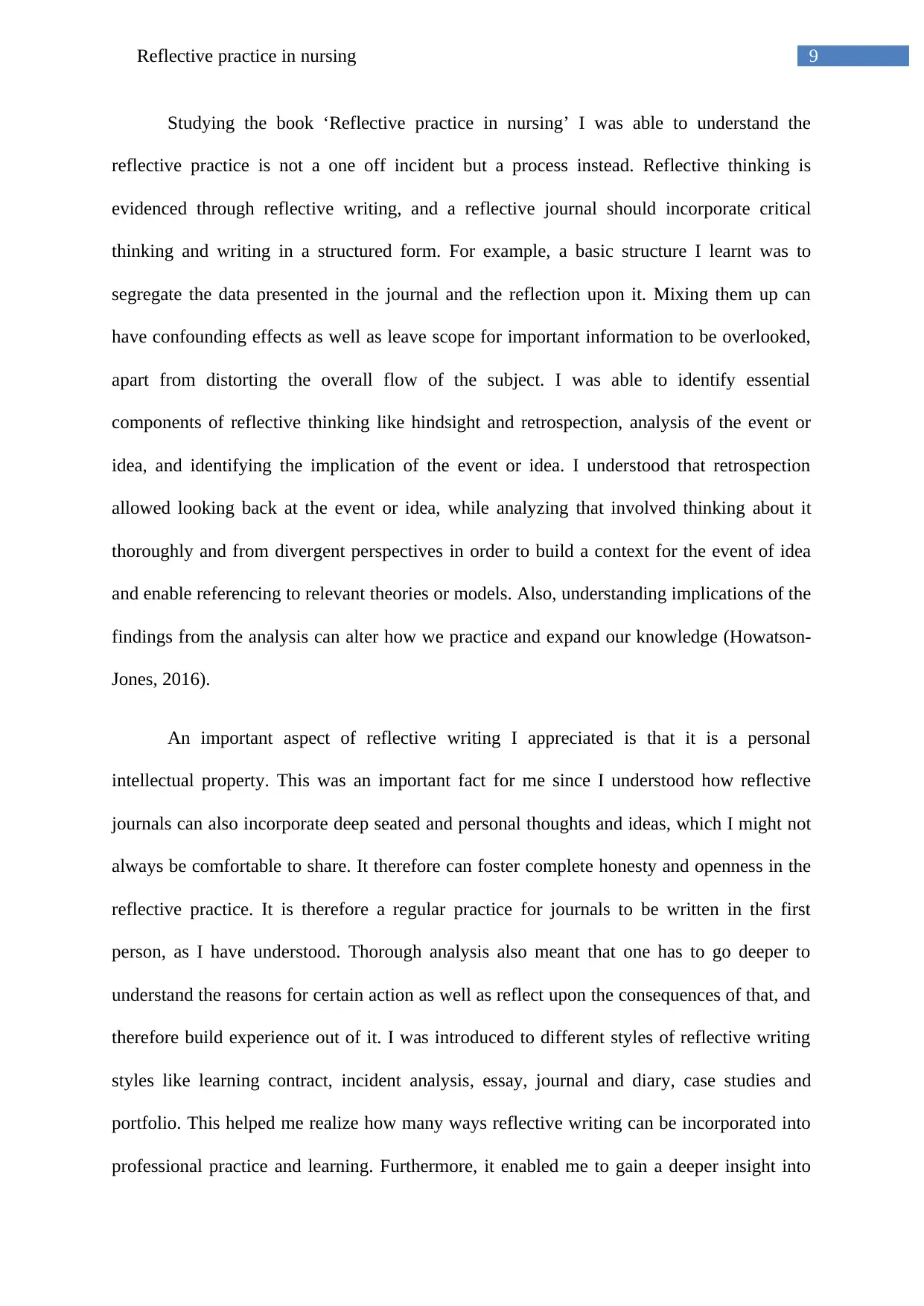
9Reflective practice in nursing
Studying the book ‘Reflective practice in nursing’ I was able to understand the
reflective practice is not a one off incident but a process instead. Reflective thinking is
evidenced through reflective writing, and a reflective journal should incorporate critical
thinking and writing in a structured form. For example, a basic structure I learnt was to
segregate the data presented in the journal and the reflection upon it. Mixing them up can
have confounding effects as well as leave scope for important information to be overlooked,
apart from distorting the overall flow of the subject. I was able to identify essential
components of reflective thinking like hindsight and retrospection, analysis of the event or
idea, and identifying the implication of the event or idea. I understood that retrospection
allowed looking back at the event or idea, while analyzing that involved thinking about it
thoroughly and from divergent perspectives in order to build a context for the event of idea
and enable referencing to relevant theories or models. Also, understanding implications of the
findings from the analysis can alter how we practice and expand our knowledge (Howatson-
Jones, 2016).
An important aspect of reflective writing I appreciated is that it is a personal
intellectual property. This was an important fact for me since I understood how reflective
journals can also incorporate deep seated and personal thoughts and ideas, which I might not
always be comfortable to share. It therefore can foster complete honesty and openness in the
reflective practice. It is therefore a regular practice for journals to be written in the first
person, as I have understood. Thorough analysis also meant that one has to go deeper to
understand the reasons for certain action as well as reflect upon the consequences of that, and
therefore build experience out of it. I was introduced to different styles of reflective writing
styles like learning contract, incident analysis, essay, journal and diary, case studies and
portfolio. This helped me realize how many ways reflective writing can be incorporated into
professional practice and learning. Furthermore, it enabled me to gain a deeper insight into
Studying the book ‘Reflective practice in nursing’ I was able to understand the
reflective practice is not a one off incident but a process instead. Reflective thinking is
evidenced through reflective writing, and a reflective journal should incorporate critical
thinking and writing in a structured form. For example, a basic structure I learnt was to
segregate the data presented in the journal and the reflection upon it. Mixing them up can
have confounding effects as well as leave scope for important information to be overlooked,
apart from distorting the overall flow of the subject. I was able to identify essential
components of reflective thinking like hindsight and retrospection, analysis of the event or
idea, and identifying the implication of the event or idea. I understood that retrospection
allowed looking back at the event or idea, while analyzing that involved thinking about it
thoroughly and from divergent perspectives in order to build a context for the event of idea
and enable referencing to relevant theories or models. Also, understanding implications of the
findings from the analysis can alter how we practice and expand our knowledge (Howatson-
Jones, 2016).
An important aspect of reflective writing I appreciated is that it is a personal
intellectual property. This was an important fact for me since I understood how reflective
journals can also incorporate deep seated and personal thoughts and ideas, which I might not
always be comfortable to share. It therefore can foster complete honesty and openness in the
reflective practice. It is therefore a regular practice for journals to be written in the first
person, as I have understood. Thorough analysis also meant that one has to go deeper to
understand the reasons for certain action as well as reflect upon the consequences of that, and
therefore build experience out of it. I was introduced to different styles of reflective writing
styles like learning contract, incident analysis, essay, journal and diary, case studies and
portfolio. This helped me realize how many ways reflective writing can be incorporated into
professional practice and learning. Furthermore, it enabled me to gain a deeper insight into
Paraphrase This Document
Need a fresh take? Get an instant paraphrase of this document with our AI Paraphraser
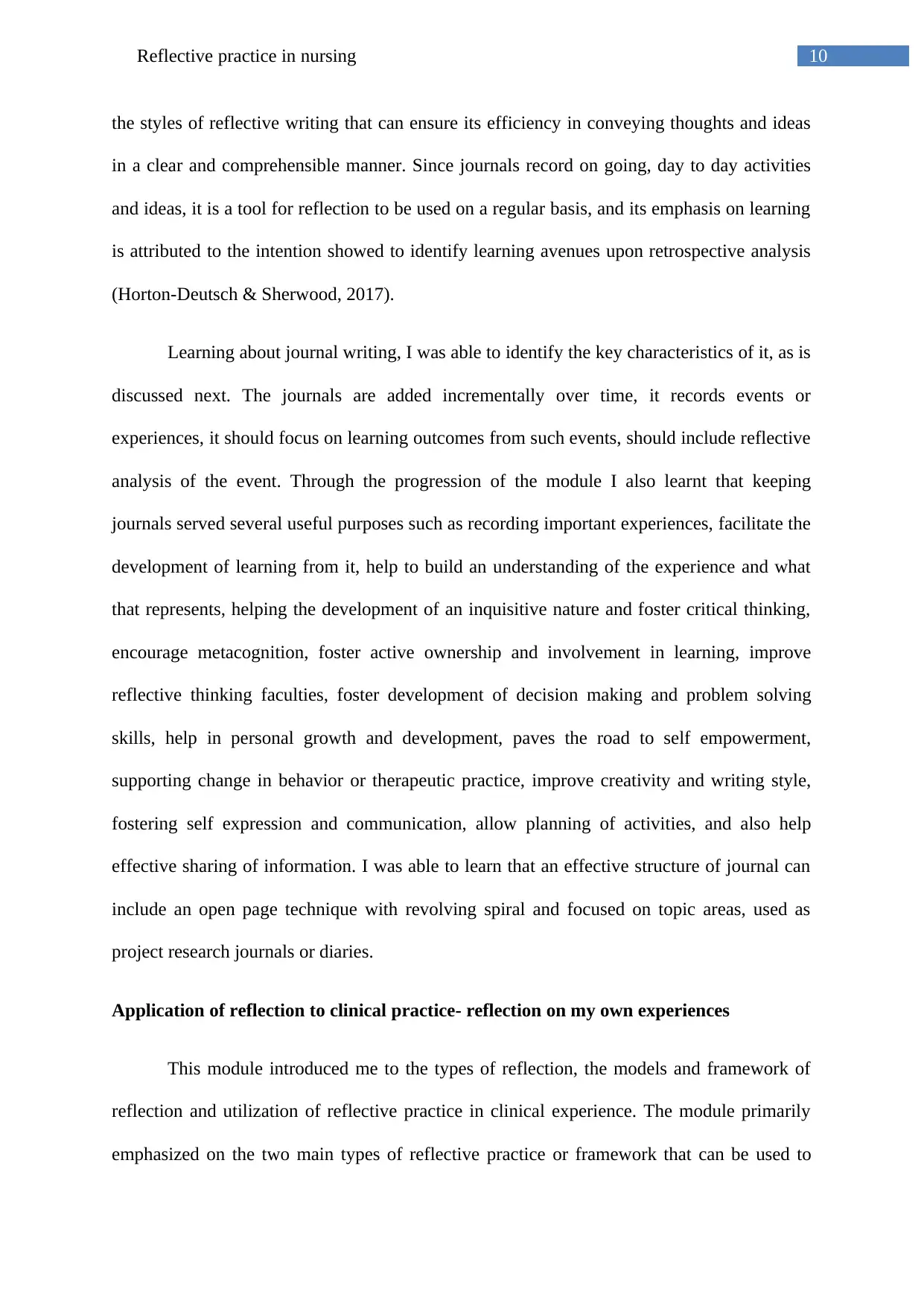
10Reflective practice in nursing
the styles of reflective writing that can ensure its efficiency in conveying thoughts and ideas
in a clear and comprehensible manner. Since journals record on going, day to day activities
and ideas, it is a tool for reflection to be used on a regular basis, and its emphasis on learning
is attributed to the intention showed to identify learning avenues upon retrospective analysis
(Horton-Deutsch & Sherwood, 2017).
Learning about journal writing, I was able to identify the key characteristics of it, as is
discussed next. The journals are added incrementally over time, it records events or
experiences, it should focus on learning outcomes from such events, should include reflective
analysis of the event. Through the progression of the module I also learnt that keeping
journals served several useful purposes such as recording important experiences, facilitate the
development of learning from it, help to build an understanding of the experience and what
that represents, helping the development of an inquisitive nature and foster critical thinking,
encourage metacognition, foster active ownership and involvement in learning, improve
reflective thinking faculties, foster development of decision making and problem solving
skills, help in personal growth and development, paves the road to self empowerment,
supporting change in behavior or therapeutic practice, improve creativity and writing style,
fostering self expression and communication, allow planning of activities, and also help
effective sharing of information. I was able to learn that an effective structure of journal can
include an open page technique with revolving spiral and focused on topic areas, used as
project research journals or diaries.
Application of reflection to clinical practice- reflection on my own experiences
This module introduced me to the types of reflection, the models and framework of
reflection and utilization of reflective practice in clinical experience. The module primarily
emphasized on the two main types of reflective practice or framework that can be used to
the styles of reflective writing that can ensure its efficiency in conveying thoughts and ideas
in a clear and comprehensible manner. Since journals record on going, day to day activities
and ideas, it is a tool for reflection to be used on a regular basis, and its emphasis on learning
is attributed to the intention showed to identify learning avenues upon retrospective analysis
(Horton-Deutsch & Sherwood, 2017).
Learning about journal writing, I was able to identify the key characteristics of it, as is
discussed next. The journals are added incrementally over time, it records events or
experiences, it should focus on learning outcomes from such events, should include reflective
analysis of the event. Through the progression of the module I also learnt that keeping
journals served several useful purposes such as recording important experiences, facilitate the
development of learning from it, help to build an understanding of the experience and what
that represents, helping the development of an inquisitive nature and foster critical thinking,
encourage metacognition, foster active ownership and involvement in learning, improve
reflective thinking faculties, foster development of decision making and problem solving
skills, help in personal growth and development, paves the road to self empowerment,
supporting change in behavior or therapeutic practice, improve creativity and writing style,
fostering self expression and communication, allow planning of activities, and also help
effective sharing of information. I was able to learn that an effective structure of journal can
include an open page technique with revolving spiral and focused on topic areas, used as
project research journals or diaries.
Application of reflection to clinical practice- reflection on my own experiences
This module introduced me to the types of reflection, the models and framework of
reflection and utilization of reflective practice in clinical experience. The module primarily
emphasized on the two main types of reflective practice or framework that can be used to
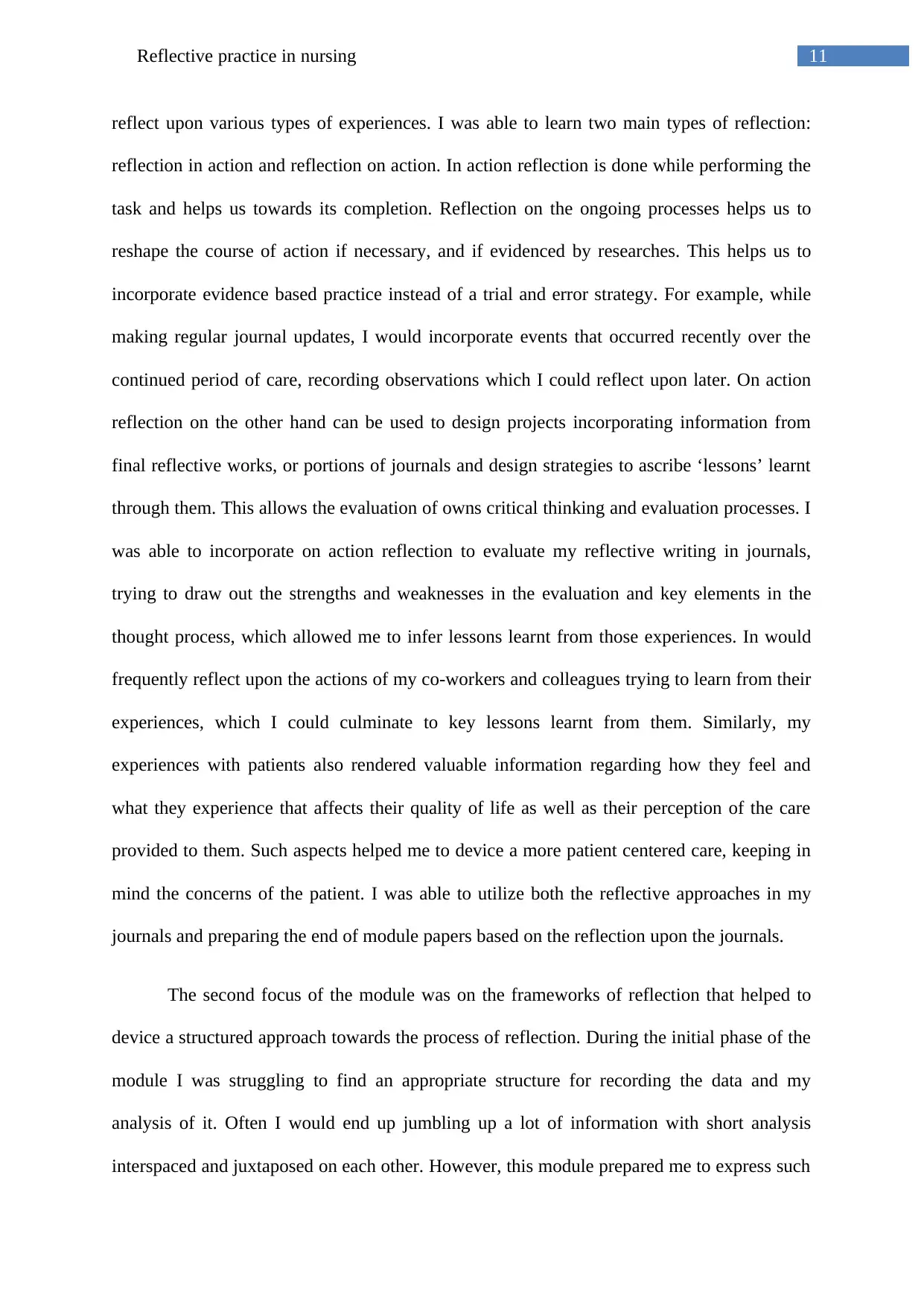
11Reflective practice in nursing
reflect upon various types of experiences. I was able to learn two main types of reflection:
reflection in action and reflection on action. In action reflection is done while performing the
task and helps us towards its completion. Reflection on the ongoing processes helps us to
reshape the course of action if necessary, and if evidenced by researches. This helps us to
incorporate evidence based practice instead of a trial and error strategy. For example, while
making regular journal updates, I would incorporate events that occurred recently over the
continued period of care, recording observations which I could reflect upon later. On action
reflection on the other hand can be used to design projects incorporating information from
final reflective works, or portions of journals and design strategies to ascribe ‘lessons’ learnt
through them. This allows the evaluation of owns critical thinking and evaluation processes. I
was able to incorporate on action reflection to evaluate my reflective writing in journals,
trying to draw out the strengths and weaknesses in the evaluation and key elements in the
thought process, which allowed me to infer lessons learnt from those experiences. In would
frequently reflect upon the actions of my co-workers and colleagues trying to learn from their
experiences, which I could culminate to key lessons learnt from them. Similarly, my
experiences with patients also rendered valuable information regarding how they feel and
what they experience that affects their quality of life as well as their perception of the care
provided to them. Such aspects helped me to device a more patient centered care, keeping in
mind the concerns of the patient. I was able to utilize both the reflective approaches in my
journals and preparing the end of module papers based on the reflection upon the journals.
The second focus of the module was on the frameworks of reflection that helped to
device a structured approach towards the process of reflection. During the initial phase of the
module I was struggling to find an appropriate structure for recording the data and my
analysis of it. Often I would end up jumbling up a lot of information with short analysis
interspaced and juxtaposed on each other. However, this module prepared me to express such
reflect upon various types of experiences. I was able to learn two main types of reflection:
reflection in action and reflection on action. In action reflection is done while performing the
task and helps us towards its completion. Reflection on the ongoing processes helps us to
reshape the course of action if necessary, and if evidenced by researches. This helps us to
incorporate evidence based practice instead of a trial and error strategy. For example, while
making regular journal updates, I would incorporate events that occurred recently over the
continued period of care, recording observations which I could reflect upon later. On action
reflection on the other hand can be used to design projects incorporating information from
final reflective works, or portions of journals and design strategies to ascribe ‘lessons’ learnt
through them. This allows the evaluation of owns critical thinking and evaluation processes. I
was able to incorporate on action reflection to evaluate my reflective writing in journals,
trying to draw out the strengths and weaknesses in the evaluation and key elements in the
thought process, which allowed me to infer lessons learnt from those experiences. In would
frequently reflect upon the actions of my co-workers and colleagues trying to learn from their
experiences, which I could culminate to key lessons learnt from them. Similarly, my
experiences with patients also rendered valuable information regarding how they feel and
what they experience that affects their quality of life as well as their perception of the care
provided to them. Such aspects helped me to device a more patient centered care, keeping in
mind the concerns of the patient. I was able to utilize both the reflective approaches in my
journals and preparing the end of module papers based on the reflection upon the journals.
The second focus of the module was on the frameworks of reflection that helped to
device a structured approach towards the process of reflection. During the initial phase of the
module I was struggling to find an appropriate structure for recording the data and my
analysis of it. Often I would end up jumbling up a lot of information with short analysis
interspaced and juxtaposed on each other. However, this module prepared me to express such
⊘ This is a preview!⊘
Do you want full access?
Subscribe today to unlock all pages.

Trusted by 1+ million students worldwide
1 out of 20
Related Documents
Your All-in-One AI-Powered Toolkit for Academic Success.
+13062052269
info@desklib.com
Available 24*7 on WhatsApp / Email
![[object Object]](/_next/static/media/star-bottom.7253800d.svg)
Unlock your academic potential
Copyright © 2020–2026 A2Z Services. All Rights Reserved. Developed and managed by ZUCOL.





